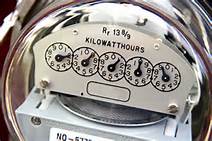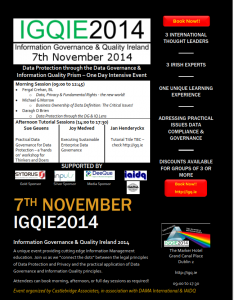The International Association for Information and Data Quality is dead. I just don’t think they have noticed. Perhaps they have been distracted by the critical success of their IDQS14 conference, an event that I was privileged to have been a sounding board about during planning and which my company provided “hands to the pump” for by way of sponsorship, even though we were never going to be able to attend in person.
You see, I really cared about IAIDQ. I was a Charter Member. I was present at many of the initial meetings in 2003 and 2004 in London where input from Europeans was being sought about the structure and focus of a “professional body for likeminded people working in information and data quality”.
I was the Director of Publicity (aka VP Marketing) and, for four great years, I was the face and voice of the Association at public meetings world wide. I identified World Quality Day as an event that IAIDQ could and should mark in the annual calendar as a rallying point for members internationally. I lead the “Voice of the Customer” research conducted in 2006-2007 to identify the core values of the Association, as expressed by the membership. That project involved surveying all members at the time (about 300 world wide) and having coffee and talking with as many members and prospective members as I could get in contact with at conferences or over Skype.
Customer. Community. Collaboration. Commitment. Continuous Improvement. These where the “5C’s” that the customer wanted at the heart of IAIDQ, and it’s what I and many of the Directors I served with worked hard to try to achieve.
On top of my Publicity role I jumped in to help out on other areas of the Board where input or resource was lacking. The CRM system that has just been implemented by IAIDQ was identified and prototyped by me back in 2006, but implementation to production in a secure and stable fashion was beyond my skillset at the time. I was one of the original team working on the development of IQCP and personally wrote a number of the questions that are on the exam. Heck, I think I’m responsible for Jim Harris of OCDQBLOG (who did his first podcast with me for IAIDQ many years ago).
But we have failed.
Despite having a critically successful event in Virginia this year, an event that my company was proud to be behind because it was conceived as a fun (community) event where people could let their hair down and network (collaboration), and do something that the membership and prospective membership would value and enjoy (customer), I have had to conclude that the IAIDQ is dead, but just doesn’t know it yet.
(For the avoidance of any doubt – I never held any other role on the IAIDQ Board other than Director of Publicity. I did found and lead the Irish Community of Practice and help to found the UK Community of Practice. But that’s all. )
My view is based on the following:
Bizarre Board Decisions
I’ve learned that the Board of Directors dismissed Joy Medved as Director of Events during the conference, but apparently forgot to tell her until a week later. I know Joy and work with Joy. I know she was incredibly passionate about the IAIDQ and was a strong advocate for a “get the basics right” approach to rebuilding the Association.
I know Joy had expressed frustration with the direction of the Association and was considering resigning. However, when a volunteer Director puts together an event that gets people saying positive things about the Association for the first time in a long time, any sensible Board would work to keep that volunteer engaged and listen to their concerns. Instead, the IAIDQ Board has chosen to dismiss a Director who has done incredible work rebuilding the relationships between IAIDQ and other professional bodies and conference organisers and who envisioned an event that actually met the promise of the “5C” values of the Association.
That is just bizarre.
Equally bizarre is the apparent time lag in informing Joy. First rule of business: when you’ve sacked someone, tell them. It seems like it took the IAIDQ leadership a week to pass the message on to Joy. That stinks from a governance perspective.
Furthermore, it appears that the IAIDQ Board has decided against engaging in collaboration with other organisations. My experience on the IAIDQ Board and as the founder of their first Community of Practice is that to help develop a foothold in new markets or find new ways to serve audiences, collaboration is necessary. No individual or organisation can do all things themselves.
A key problem that new entrants in to the data space have is figuring out a career and certification path. That is a key problem that needs to be solved for both individuals and employers. Right now it is not being solved. But it can only be solved through collaboration between professional bodies to educate the market.
But the IAIDQ seems content to keep building walls. That’s just nuts. As an Information Quality consultant and trainer (heck, I teach an IQCP certification syllabus) I regularly hammer people over the head with Deming’s 14 Points. One of those is the need to remove barriers and instil pride of workmanship. Building up walls and pulling up drawbridges can best be described as “odd” and counter-intuitive in an organisation that is supposed to espouse quality management principles and has “Collaboration” as a key core value.
It also makes it difficult for IAIDQ to establish a point of presence in new markets. The experience of the Irish and UK CoPs evidences what happens when the IAIDQ’s Board doesn’t engage in collaboration – both Communities relied on collaboration with national informatics societies (Irish Computer Society and British Computer Society) to grow and operate. In both cases engagement from the top was required – basic “diplomacy between Heads of State” if you will. It didn’t happen. Both CoPs died away.
At one point Ireland accounted for over 10% of the IAIDQ’s world-wide membership (approx. 40 people out of approximately 380 members in 2006/2007). Today, there is at most one paid up member here that I know of.
I hope the view from the IAIDQ’s Ivory Tower is nice.
Absence of an IQCP ecosystem
I am a strong believer in the importance of skills certification for Information Quality. I have been a staunch advocate of IQCP and my company was the first in the world to offer IQCP training. It’s likely that I have personally trained or coached more current IQCP holders than anyone else in the world. However, it has been a constant struggle to get engagement. Key information was out of date or full of errors for over two years, despite the errors being spotted by my clients and fed back.
To an outsider trying to deal with IQCP, it appears that it appears like it is being run as a mini-fiefdom of a small group of people. That is not sustainable, and it does a disservice to the wonderful work that has been done recently by Dan Myers in particular.
I was on the Board that initiated the IQCP process. At that time the strategy was that IAIDQ would create an ecosystem within which trainers and content developers could contribute to the body of knowledge and grow the certification. That was a strategy I could get behind and sell as Director of Publicity because it aligned with the 5Cs of the core values.
It hasn’t happened. IQCP has failed to reach critical mass. But the same levers keep being pulled hoping for a different result.
No consistent product delivery in nearly 2 years
A core product of IAIDQ membership is advertised as being the Journal (originally a newsletter issued monthly it became a Journal issued quarterly). From 2005 to 2010 I was among the most frequent contributor of articles to the IAIDQ Newsletter/Journal. I was proud to contribute and it helped me stretch my thinking in the Information Quality space.
Since 2011 the Journal has appeared four times – twice in 2012, once in 2013 and once in 2014. I volunteered time from myself and one of the team in my business to look at what could be done with the tonnes of content that apparently had been submitted. Like Old Mother Hubbard we found the cupboard to be bare. Not enough content existed to produce an edition.
An Association that cannot consistently produce a single core product has a problem. Where there is an absence of volunteered content, and an absence of volunteers to package and produce the core product, then there is a problem. And the problem is not one of grand vision. It’s one of basic operations. And the answer to a problem like that is not to leap into something new and hope that that reinflates the passions of volunteers to crank out the goods.
No Volunteers
The IAIDQ is failing most of all because it cannot attract or retain volunteers. This has been an issue since 2006/2007at least. I have personally had volunteers who were working with me on Publicity activities when I was a Director walk away because of the conduct of other officers of the Association towards them. Apparently, it hasn’t improved. Those officers are still around, but the volunteers aren’t.
The lack of volunteers is not unique to IAIDQ. It is a common issue across the not-for-profit/voluntary sector. However, the consensus is that the approach to addressing that is to work the values and, in true quality management fashion, focus on the most important needs of your customers. That’s why IDQS14 was a great opportunity to reboot the Association. IAIDQ’s customers want to have fun and a sense of community because the day job is just so darned stressful. It’s an opportunity missed, I fear.
Volunteers don’t rally around a vague future strategy, and a strategy does not arise from talking within a sub-set of the leadership group about what might be done. Volunteers need something they can emote with, that taps into their intrinsic motivation to contribute, and pushes them to find the extra hours in their busy days to write articles, phone sponsors, travel to meetings, run a website, co-ordinate events, sit on conference calls, and generally all the stuff that needs to be done to do the business of an Association.
One thing I’ve learned running my own business is that not-for-profits are in a perpetual state of “startup” – and that’s where clarity of vision, clarity of values, and prioritisation around the resources you have is essential. If you can’t answer the question “Who will do that?” with a name that is actually on-board to do that thing, it’s not going to get done!
For many years, I was that name. I was so passionate about IAIDQ that I tapped my insomnia, and my personal finances in some cases, to get things done for the Association, to design marketing materials, man stands, and communicate constantly the core values of the Association to try and attract like minded people. IAIDQ no longer has that pool of people. But it’s not because those people don’t exist. I meet them on twitter and at events all the time. I count some people I’ve never met as friends in the data community. But the IAIDQ is not engaging those passions any more. High-brow dreams of a future method of operating will remain just that. Just like the 80% of startups that fail because they lack the means to execute and the clarity of vision to know what to kill off.
In March I was asked if I’d be manning an IAIDQ booth at a conference in London. I said no. For the first time in a decade. The passion to contribute is gone. Because the organisation has turned insular. And nobody says “thank you” any more.
Group Think
Worst of all I believe the Association has fallen foul of Group Think. Over the years, as a Director and then as a passionate volunteer, and most recently as a candidate for the Presidency, I’ve presented evidence of negative market sentiment, stagnant membership numbers, and the opportunities for expansion through collaboration. As Director Publicity/VP Marketing I took it on as part of my role to challenge decisions at the Board level on whether they aligned with the “5 Cs” of the core values. I was an argumentative little prick, but always accepted the final Board decision once the debate was had.
But over the years, debate has become more and more the sound of one voice. Increasingly I have found the Board dismissive of evidence and filling in optimistic assumptions where hard assed reality is required. It reminds me of the joke about how the economist was rescued from the desert island: “first assume the existence of a lifeboat”.
Last year I submitted my candidacy for President, after nearly five years of being asked by various members of the Board and various advisors to the Association and declining it because I had other priorities and wanted to avoid any implication that I’d spent four years as Director of Publicity just to be President. Don’t get me wrong, I feel that the Presidency of the Association as a great honour and a crucially important role. Which is why I didn’t want to take it on at a time when I couldn’t give it 100%.
Last year I felt it was then or never. I assessed the situation of the Association and submitted a high level strategic plan to address the issues that people I’d connected with in the community had raised with me, often in hushed tones as if they were afraid to speak truth to power.
The Board, many of whose members had personally called me and quite literally begged me to self-nominate, ultimately voted against my candidacy. I accepted their decision, and still do. But I cannot respect it any longer.
I firmly believe that the Board ultimately dismissed Joy Medved because she took on my role on the Board of argumentative pricker of consciences, the devil’s advocate against group think and Pollyanna-ish assumptions. She ran an event that was a critical success, one that I and my company were proud to be associated with, and which ticked all the boxes for alignment with the original core values of the Association.
The Group Thinkers will attempt to rationalise their decision from a number of directions and I fully expect attempts at character assassination (because that was done to me), but as an outsider with experience on the inside it looks very much like vested interests took an axe to the legs of a volunteer whose approach to delivering value to the customer was making them uncomfortable – because it was working, and because she wanted to push others to work hard on delivering core services and core values.
The Future
I fully expect the IAIDQ Board to continue to pursue a vague and uncertain strategic plan, one that assume the existence of volunteers who give a damn. But I don’t hold out hope for the future of the Association. Its heart is gone. Its values, defined by the many, have been cast aside because they have become inconvenient to a few.
From our founding vision of an International community of like-minded people who were passionate about Information and Data Quality, I fear that the IAIDQ has been hollowed out to a US-centric vipers’ nest of vested interests that has turned its back on its customers as it chases its tail, blissfully happy in the ignorance of how the world of professional associations has moved or how its actions towards volunteers, supporters, and others makes it look.
Commercially, my company will continue to provide training in IQCP to clients who request it or to whom we are currently committed, but we will be looking to the market for an alternative as soon as possible as we cannot rely on a certification provider who will likely not exist in 12 month’s time.
The idealist me of 2004 who signed on to help found IAIDQ hopes I’m wrong about the present and the future of IAIDQ and that, in this 10th anniversary year something will change. But the realistic me of 2014 fears I’m not.
To paraphrase the sci fi character Dr Who: “Does the IAIDQ look tired to you?”
Update: What can be done?
A trusted advisor suggested I make this read less like a rant (which I didn’t intend it to be) and more like constructive criticism by putting on my consultant’s hat and making some suggestions for improvement.
Looking at IAIDQ as a consultant, I would make the following recommendations:
Do this:
- Clearly and publicly define who your customer is and what the most important needs are of that customer that the Association is going to meet – and HOW.
- Tailor ambition to capability, at least until such time as core value proposition elements are stable and the customer can see clear value in being associated with IAIDQ.
- Ensure that there is a value proposition for members, something that they can see is worth their dollars/euros/zloti
- Make sure that deliverables happen regularly and as promised. Agile methods might be appropriate, but waiting for perfection in all things is worse than delivering a “beta”.
- Create a simple vision of the future that people can get behind. And COMMUNICATE IT
- Build bridges with other organisations. Lots of bridges. That is a collaboration and community strategy that aligns with the principles espoused by Deming, Juran, and other pioneers in Quality.
- Develop a habit and practice of ‘inclusivity and reward’, where volunteers and contributors can feel that their voice is heard and their contributions are valued.
- Give careful consideration to the meaning of the word “International” in the Association’s name. Use it or lose it.
Don’t do this:
- Craft a master plan strategy for the future without being clear on what distinct need you are serving.
- Define a vision and a plan for the future that ends with “and then we will have the volunteers come on board to do this”. Lots of non-profits make that mistake.
- Overestimate your capacity for delivery and capability for change, based on an assumption that volunteers will appear. Assume they won’t and work from there.
- Attempt to deliver an all encompassing “one-size-fits-all” offering without having robust alliances in place
These are basically the 10 things I’ve been saying for a number of years as a Director, volunteer, and member of the IAIDQ.
They apply to that body, but they are universally applicable to all professional membership organisations that rely on volunteers to deliver the goods. Hopefully someone will read this and learn from it. It might even be the IAIDQ.



